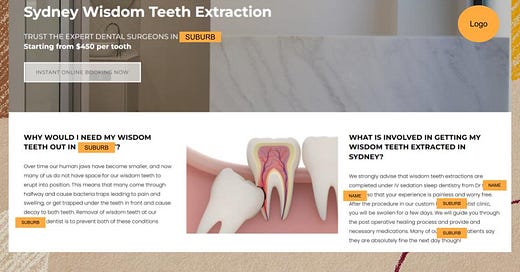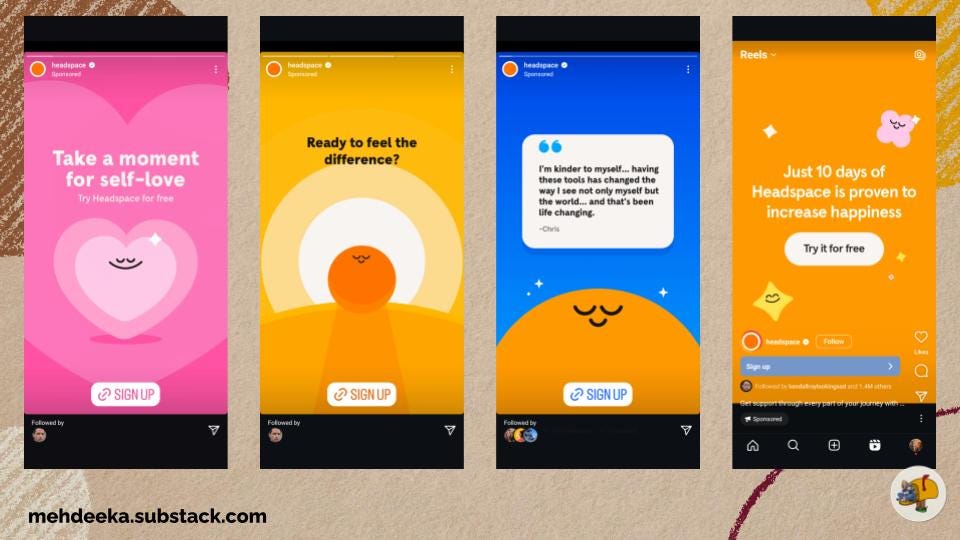🦷What I learned about content marketing by getting my teeth removed
Season 9, Issue 2: Lessons from the dentist's chair
📬In this issue:
The customer journey and all its glorious stages
Addressing customer referrals
All the reasons why I thought my dentist was a bit of an asshole (and how I learned I was right)
Smile, Mehketeers!
How are you enjoying seeing me back in your inboxes? I’m writing this before the first issue (which was on analysing marketing efforts from Headspace) is sent, so it feels like typing into the void.
This week I’m cosplaying a LinkedIn sales bro, with a “what getting four teeth ripped out of my mouth taught me about B2B sales cycles” — except I actually do think I have a real business lesson from this.
To recap the situation:
All four of my wisdom teeth were 100% emerged from my gums, only one was impacted
Every time I went to the dentist, I was told “one day, they’ll have to come out”
Several close friends had wisdom teeth issues that really inconvenienced their lives, and as I am self-employed, I was motivated by them coming out “on my terms” at a time that was convenient for me
I had braces as a teenager, so really I have spent enough hours in a dentist chair and I wanted to be put under for the surgery (I have never been sedated nor had surgery before this too!)
In terms of customer lifecycle, I was problem aware + solution aware, and shopping for a provider.
I had been to my dentist a few times, sussing out how I felt about them, and decided they were trustworthy enough to give quite a few thousand dollars to. I was also kind of advertising everywhere that getting my wisdom teeth out was a 2024 goal of mine, and people really honed in on that fact about me, so there was some accountability to actually book in.
Once the year was coming to a close and my deadline was looming, I booked in. I explicitly told my dentist (whom at this point I believed to be an asshole because he treated the dental hygenists kind of mean and forced everyone to refer to him as Dr ___, even in written messages on Slack! [I caught a peek at the receptionist’s computer]) “I do not want to be awake for this.”
He said all good, we can do it right here in the shop and I won’t have to travel to a hospital.
Amazing.
Then I started telling everyone I was actually doing it! Advice from people who’d had it done started rolling in. For this, I was super grateful.
Now here’s where the expectations I had for this ~$5,000 commitment started falling apart.
Via email, the dental staff kept saying “sedationist” instead of “anasthesiologist”. I simply thought they must be the same, maybe one is paid less?
Leading up to the appointment, I didn’t receive any information around what to expect or how to prepare for recovery, I was simply told I must be picked up by an adult to be escorted home and I wouldn’t be allowed to leave on my own.
On the day of, I need to sign a consent form which has a line item confirming I was given recovery instructions - when I asked for the instructions they said they’d give it to the person picking me up and begrudgingly gave me a print out when I pushed for one.
I am actually super upset about the sedation thing. I was awake for the procedure, and they said “don’t worry, you won’t remember it”, but I do, and also even if I didn’t remember it, it’s not what I asked for. Yes, maybe I should have googled what the difference was, but when I say “I do not want to be awake” and I get confirmation that I won’t be awake, that really doesn’t mean “you’ll be awake but we’re pretty sure you won’t remember it”.
Sales lesson: Don’t say you can do things you don’t do
Secondly, I was better prepared by my friends and acquaintances for recovery than the handout the dentist gave me. It was a lot of hand waving and “you’ll be fine, just come back if you need to.”
Marketing lesson: You’re the subject matter expert, don’t forget what it’s like to know nothing about the topic
Yeah, my dentist has probably performed this procedure hundreds, if not thousands, of times. I have experienced it exactly zero times. His lack of empathy for my concerns, anxiety, and position of knowledge was pretty shit to experience. Don’t do this to your customers.
As soon as I told people I’d actually completed my goal, a surprisingly large amount of people showed an interest in my experiences and asked for tips. A lot of people know that at some point, they’ll have to get their wisdom teeth out, but for whatever reason haven’t done it yet.
There are multiple stages of the customer lifecycle not being addressed (and there’s not a lot of quality info on Google)
Customer lifecycle stages
Ok I think everyone in this funnel is problem aware (i.e. has wisdom teeth) and solution aware (rippin’ em out)
Research, compiling suppliers, and comparing options (e.g. gas vs sedation vs raw dogging it)
Scheduling and anticipating the appointment
The procedure itself
Recovery
Testimonial (because BOY were people asking for recommendations)
My dentist was missing literally every single one of these!!!!!!
I don’t want to dox my dentist, but looking at their website, it is optimised for location-based SEO, not necessarily content or keywords.
This is a super sales-driven approach to acquiring customers, and by that I mean “bring me new leads” rather than re-visiting your backbook, nurturing leads that didn’t convert straight away, encouraging referrals, and building deeper relationships.
Content for every lifecycle stage
I once heard of a talk I didn’t attend, which was from RealEstate.com.au, which allegedly covered their content strategy and how it addressed every stage of homeownership, starting from dreaming about being a home owner and ending pretty much with selling it all and moving into retirement or organising your real estate assets in your will.
Pretty crazy, but you know what? REA Group’s stock is $245 a share while Domain’s is $4.38 (this is actually insane, and accurate as of March 4, 2025.)
For my dental example, I would have LOVED to have known that “conscious sedation” is the industry preference for dental surgery, and been given a shopping list and recipe ideas for things I could eat during recovery.
One of my friends told me not to drink out of a straw and not to eat strawberries or other fruits with tiny seeds (risk of getting a seed stuck in the wound.) Before that I was 100% thinking of a nice strawberry smoothie. You know who didn’t tell me those two tips? My dentist. It wasn’t on their recovery handout.
Capturing referrals
Building a referral program is not easy, and I’ve covered it before:
But for something as low volume as a dentist, an honour system of “hey, my friend is a customer of yours and said if I mention their name, I can get 10% off” should be achievable.
I did get a text message check in after the procedure that was more along the lines of “confirming you are not experiencing a medical emergency, if so, go to a hospital, don’t come here.” What could have been nice is that check in, plus a meal suggestion, and an invitation to leave a review on Google, recommend to a friend, or something similar.
Action: Really put yourself in your customer’s shoes and ask what questions they would possibly have, and then answer all of them.
Have you got all your teeth?
Hold on to them, or don’t — it’s up to you!
My final parting advice regarding wisdom teeth:
I heard that the earlier you get them out, the better your recovery will be
My top foods were really simple and thick smoothies eaten with a spoon, mash potato, scrambled eggs, and konjac jelly pouches which really do fill up your stomach and feel satiating
Pick up some medicated mouth wash and gently rock your head side to side to clean the wound — you can brush your teeth but I didn’t for the first ~2 days because it hurt to open my mouth wide
Price — I paid $500 per tooth to the dentist + $2,500 to the sedationist, and I got about $300 back from medicare
Smile!
Kayla







Ok, I'm gonna be the jerk and say "Insightful", but only because it genuinely is! Love the simple but very important takeaways.
I did take offence to one line.... - 'This is a super sales-driven approach to acquiring customers, and by that I mean “bring me new leads”'
Honestly, if someone in sales knows how to sell, they will literally approach it as relationship building, sharing, informing, and nurturing - then when the time is right, asking for the sale. This whole "I need a sale because I need to keep my job" comes from organisations that don't train their salespeople (or even sales managers). It loses more sales than it gains.
Okay I will aim to get my wisdom teeth out this year